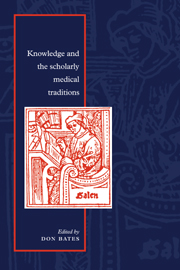Book contents
- Frontmatter
- Contents
- List of illustrations
- List of contributors
- Acknowledgements
- 1 Scholarly ways of knowing: an introduction
- Part 1 Scholarly medicine in the West
- 2 Epistemological arguments in early Greek medicine in comparativist perspective
- 3 Autopsia, historia and what women know: the authority of women in Hippocratic gynaecology
- 4 The growth of medical empiricism
- 5 Scholarship and social context: a medical case from the eleventh-century Near East
- 6 The experience of the book: manuscripts, texts, and the role of epistemology in early medieval medicine
- 7 Artifex factivus sanitatis: health and medical care in medieval Latin Galenism
- 8 Epistemology and learned medicine in early modern England
- Part 2 Chinese traditional medicine
- Part 3 Āyurvedic medicine
- Part 4 Commentaries
- Index
2 - Epistemological arguments in early Greek medicine in comparativist perspective
Published online by Cambridge University Press: 01 February 2010
- Frontmatter
- Contents
- List of illustrations
- List of contributors
- Acknowledgements
- 1 Scholarly ways of knowing: an introduction
- Part 1 Scholarly medicine in the West
- 2 Epistemological arguments in early Greek medicine in comparativist perspective
- 3 Autopsia, historia and what women know: the authority of women in Hippocratic gynaecology
- 4 The growth of medical empiricism
- 5 Scholarship and social context: a medical case from the eleventh-century Near East
- 6 The experience of the book: manuscripts, texts, and the role of epistemology in early medieval medicine
- 7 Artifex factivus sanitatis: health and medical care in medieval Latin Galenism
- 8 Epistemology and learned medicine in early modern England
- Part 2 Chinese traditional medicine
- Part 3 Āyurvedic medicine
- Part 4 Commentaries
- Index
Summary
‘Epistemology’ is a term that can be used in a looser, and in a more strict, acceptance. In the looser one, which a number of contributors to this volume appear to have in mind, it may be used of any statement or position that may be thought to imply a claim to know or that allows one to investigate how such a claim might have been sustained, for example, by reference to what is represented as the correct method to adopt. All uses of expressions for cognitive states or processes, all methodological observations, have, on this view, an epistemological component. In a stricter acceptance, however, epistemology relates solely to explicit statements that directly address such questions as the criteria of knowledge or the conditions that have to be met for a knowledge claim to be justified. While clearly no hard and fast distinctions are to be drawn between the two ends of the spectrum indicated by these acceptances, I shall be concerned here with the strict, or stricter one, that is to say with explicit discussions of the nature of knowledge and of the basis of claims to have secured it.
It is well known that extant Greek medical texts from the fifth century BC onwards offer many examples where the authors reflect self-consciously on the status of medicine. Can it be said to be an art, technē, or a branch of knowledge, epistēmē, and if so, why? What distinguishes the true practitioner from the lay person or the quack?
- Type
- Chapter
- Information
- Knowledge and the Scholarly Medical Traditions , pp. 25 - 40Publisher: Cambridge University PressPrint publication year: 1995
- 3
- Cited by

